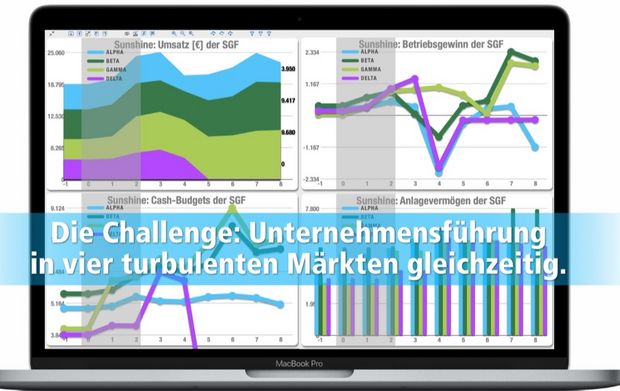Digitization rules in the new reality of digital markets include the keywords: disruption, network effects, and platform wars.

During November, students in Dr. Melanie Wiener’s course "Strategic and Market-Oriented Management" (Institute for Strategic Management) were able to experience first-hand just how dynamic service markets work today.
As part of the company business simulation BerlinSim, students had an opportunity to take over managing a (fictitious) company themselves, thereby competing with fellow students over a period of eight simulated business years as part of a relentless competition for monopolies and bankruptcy. Four different business areas had to be managed simultaneously. As in real life, success can only be achieved when there is true team spirit and if each team member contributes something to the company’s overall success.
The business game’s didactic basis is experiential learning, meaning difficult and complex decisions during the simulation require taking a personal stance. Success and failure in the market cannot leave the participants feeling indifferent, but rather it requires analysis and reflection. Part of the simulation required exploring educational material in the area of strategic management in order to provide new, real-world insight.
As the current pandemic prevented carrying out the simulation in-person, both the simulation content as well as the working setting took place online. During the two designated simulation days (Friday and Saturday between 9:00 AM and 6:00 PM), students worked together as part of a virtual team and held discussions via video conferencing. Dr. Wiener was impressed with the students’ dedication and remarked: "The students demonstrated a tremendous amount of commitment. At the end of the first day when the companies were in the middle of a recession - not to say a crisis - some teams even worked 'overtime' and asked for coaching in regard to strategic tools so that the next day, they could start the new business year with well thought-out decisions."
The “BerlinSim” game’s developer, Prof. Tobias Braun from Berlin, helped conduct the business simulation on the first day. Although he has conducted the simulation at many universities and companies, the JKU students left a lasting impression: "The Linz students slipped into their new roles as top managers in no time and demonstratively showed that they were not side-tracked or distracted when it came to making complex and sometimes unpleasant decision in response to a situation. They mastered severe crises with a high degree of resilience and made bold strategic plans come true. I was very impressed with their level of professionalism."
The students greatly appreciated the unique experience and some of the feedback included:
"It was very exciting to apply what we learned in theory to "real-world practices" (i.e. the BCG Portfolio)."
"I really enjoyed the opportunity to truly steer and develop a company. It gives you a better idea of how it all works in practice, especially during times of crisis."
"The business game should always be a part of this course."








